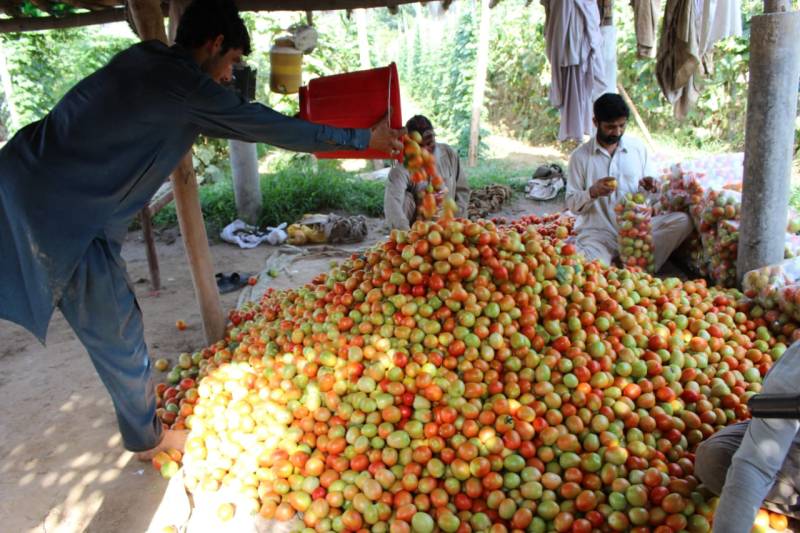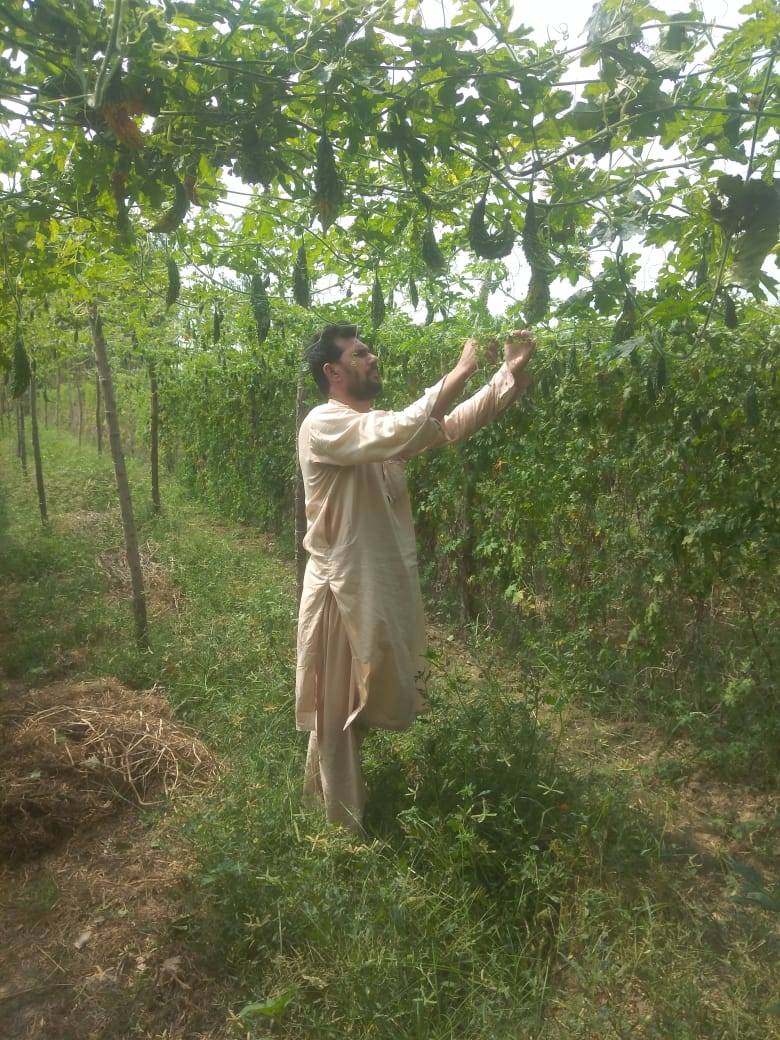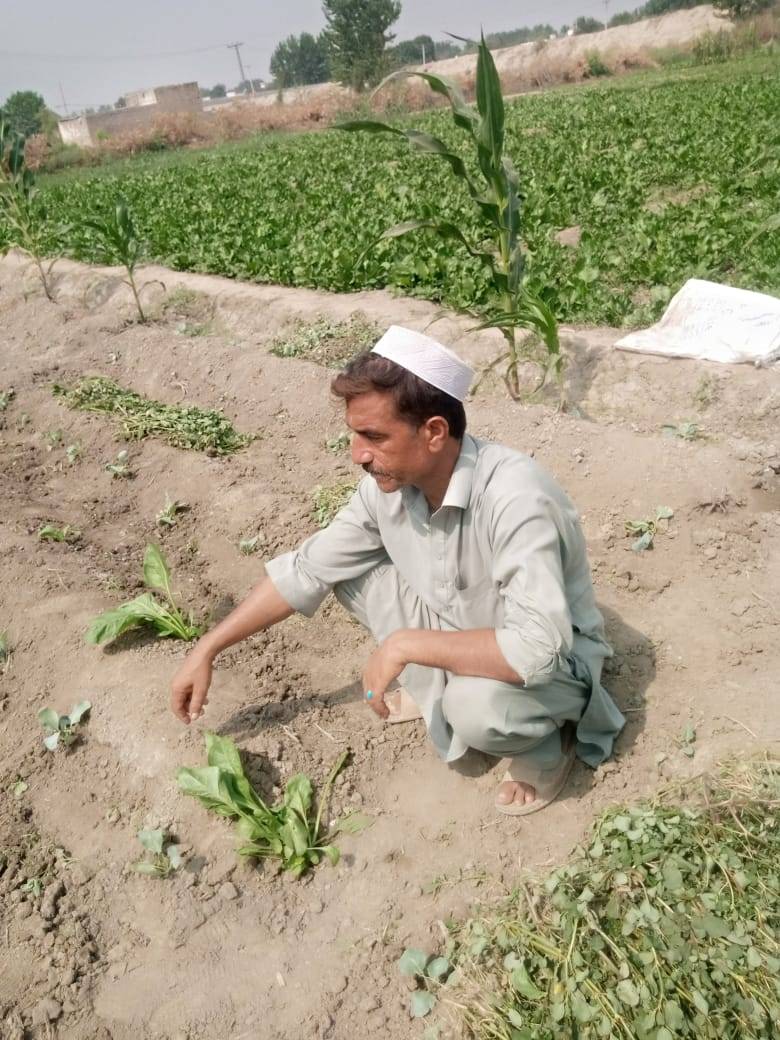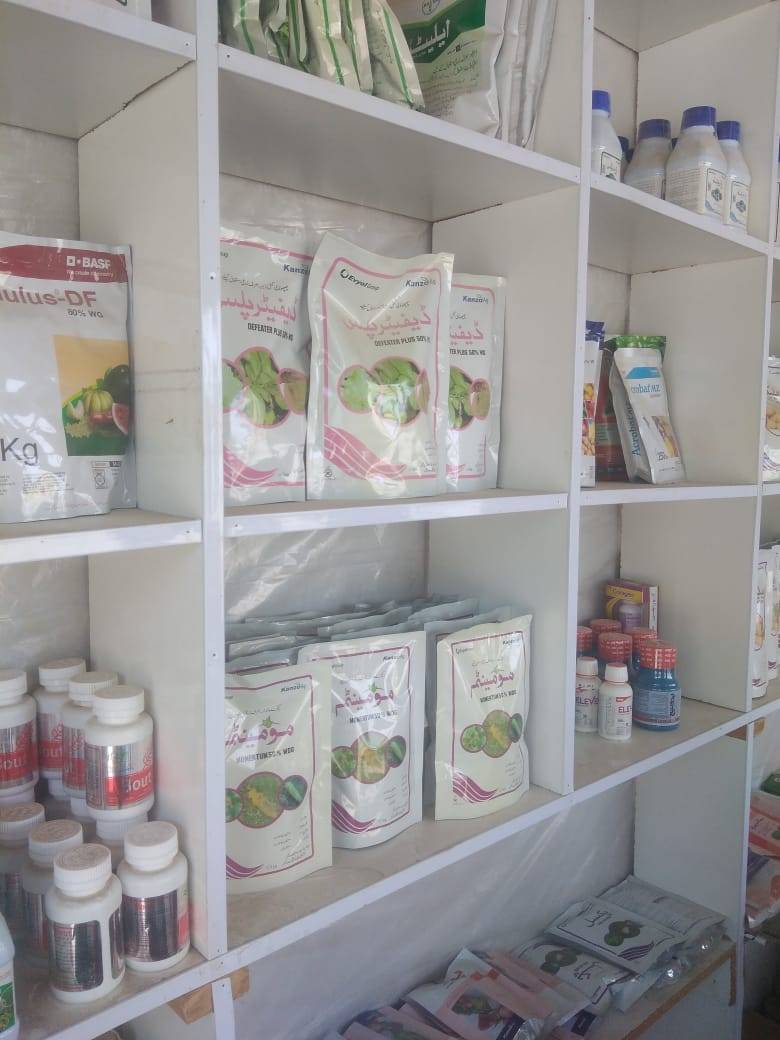
At the end of July and the beginning of August, people saw the prices of tomatoes jump by as much as 20%. One reason for this increase was the hike in prices of petroleum products such as petrol and diesel. But the other reason was a much more serious and long-term issue plaguing tomatoes in Pakistan: lower fruit production due to climate change.
Like in many other parts of the world, this past summer was the hottest ever recorded in Pakistan's Khyber Pakhtunkhwa since records were kept.
The record temperatures have had varying impacts on people, wildlife, biodiversity and agriculture. In Khyber Pakhtunkhwa, farmers feel they were handed the shortest end of the stick under the scorching sun.
Usually, during May, June and July, farmers in the Mardan district of Khyber Pakhtunkhwa grow and harvest fruits and vegetables, including muskmelon, tomatoes and other crops. But this year, unpredictable rains, heat waves and even the odd hailstorm affected crops' quantity and quality.
Hottest summer in recorded history
The summer of 2023 was the warmest on record globally. According to the World Meteorological Organisation (WMO) and the European Centre for Medium-Range Weather Forecasts (ECMWF), the world experienced three of the hottest months on record this year.
Scientists confirmed that July was likely to set the record for the hottest month on record that the world has just experienced.
United Nations Secretary General Antonio Guterres described it as: "The era of global warming has ended, and the era of global boiling has arrived".
August was also the hottest ever on record by a wide margin, and the second hottest month ever, which the world experienced after July 2023.
Globally, the impacts of a warming climate saw extreme heat waves sweep North America, Europe and Asia. Record temperatures were observed in parts of central Asia, coastal China, Japan, and South America.
The Global South Database, a project set up by Carbon Brief with support from Reuters's Oxford Climate Journalism Network (OCJN), said extreme heat waves swept many parts of the world this year, with 2023 now more likely than not to be the warmest year ever since records began.
June and July 2023 will likely exceed past average global temperature records by 0.2 degrees Celsius and 0.3 degrees Celsius, respectively. Similarly, March 2023 was the second warmest since the mid-1800s.
Farmers wilt in the summer heat
Fazal-i-Mula, who has been growing tomatoes for the past 16 years in the Babini Union council of the Mardan district, said that his family completely depends on the crop for their income.
The 37-year-old farmer said he obtained land on lease to cultivate a tomato crop. Despite tilling three acres of land with tomatoes, Mula said the crop yields barely covered his expenditures.
Mula, though, is not alone in sharing this plight. He said that farmers growing tomatoes in the district have been facing low yields for the past four years.
The major identifiable reason for him was how unpredictable the weather had become, especially with the growing prevalence of heat waves.
The farmer said that usually, they plant hybrid seeds in a nearly six-month-long period, which commences in the middle to late February and continues until early August. This year, he said that the seeds were planted by February 20.
In the initial days, the crops are covered using plastic sheets to protect them from the still relatively cold environments and the slow creep of spring.
The earliest batch of tomatoes is harvested in May, and the season continues until the first week of July. At his farm, the process continues until the first week of August.
However, due to the change in weather, he said that farmers in the district were surprised to find tomato crops become barren before the end of June.
He added that one of the greatest shocks came when rain in early May suddenly turned into a heavy hailstorm. That was followed a few days later by a brutally hot spell.
Mula bemoaned the traditional challenges of farmers, including the hike in prices of fertiliser and pesticides and the low market price of the produce compared to the past two years, as the reasons why he was feeling squeezed in the revenue segment.
The climate change effects have impacted not only Mula's tomato crops but also the crops of other farmers in Mardan and the neighbouring Charsadda district.

Muskmelon farmer Huner Gul said he grew the fruit on two acres in Mardan.
The 56-year-old farmer said that, unlike previous years, this year he had made a lot of effort to protect his crops from high humidity in the early phase of the process in March, while he made a less than judicious use of pesticides, supplements and fertilisers in the hopes of a good crop that would yield a better return.
But he was disappointed as the crop did not thrive enough. The May hailstorm, he said, caused his two-acre muskmelon orchard to dry up, costing him nearly Rs150,000 and meant that he barely even covered his costs.
Neighbouring Charsadda, known for its agricultural products and traditional sandals, used to be lucrative for farmers growing Kharif crops.
Murtaza Khan, who lives in the Painda Khel village of Charsadda, described an affliction with his crops that was similar to the complaints of Huner Gul and Fazal Mula in Mardan.
The 45-year-old farmer has been growing tomatoes and other vegetables on his land for the past 30 years.

Like Mula, he said that this year's crop suffered a premature end in the middle of June.
His loss was compounded because his other vegetables, including Pumpkin and Zucchini, also gave lower-than-usual yields with premature ends.
In its report, the Mardan Crop Reporting Services Department said that this year, the total cultivated area in the district stood at 98,856 hectares.
Of this, tomato was cultivated over 265 hectares, with total production at 3,432 tonnes.
By comparison, the muskmelon was cultivated over 491 hectares to produce some 3,928 tonnes.
However, the department said these figures were at least 10 percent lower than last year's for the district.
Data collected by the Khyber Pakhtunkhwa Directorate of Crop Reporting Services (CRS KP) for 2022-23 showed that muskmelon production fell by 4% in the province.
Similarly, the production of Kharif tomatoes fell by 8.42%, while Rabi tomato's production increased by 12% in the province.
CRS KP Director Muhammad Kaleem said that yields and productivity have been negatively affected by climate change, particularly how they have manifested in the form of heat waves, and erratic and excessive rainfall during harvest.
He said that the hot temperature in a crucial phase of crop growth accelerated that process. As a result, the crop quickly became barren.
Hottest summer impacts vegetables and fruit crops
Mardan Agriculture Extension Department's Deputy Director for Horticulture Syed Imran Shah, said that the impacts of climate change on crops were no longer a mystery and that its severe consequences were visible throughout the district.
Shah said the heat waves of early May, followed by erratic rains and a rise and fall in temperature in the summer, affected all crops, plants and local biodiversity.
The unpredictability of weather has also disturbed the pollination process, impacting flowering and shedding, consequently decreasing production and affecting both the quality and quantity of the fruits and vegetables.
He added that the worrying aspect was that predictions of climate change impact in the Paris Agreement were manifesting themselves today.
"It's here now; we are facing the drastic impacts of climate change in Mardan in 2023."
Climate resilient seeds
Murtaza, who bought hybrid seeds from the market, said these were the same seeds he had used last year, but the yield had fallen.
Similarly, Fazal-i-Mula said when they discussed seed productivity with a private seed agency, they had little in the way of a solution.
Mula added that, unlike last year, they attempted to better regulate the amount of water given to crops to prevent over-watering them on the advice of the seed agency, but the result was poorer than before.

Shah, however, contended that while hybrid seeds are great for productivity, they are not more resilient to rising temperatures than regular seeds.
"We have to deal with it," Kaleem said, adding that they need to develop seeds which are more resilient to climate change.
He added that hybrid seeds are designed to be productive for a maximum of three years. After that, such seeds lose their resilience against weather changes and diseases.
The bigger challenge, he foresaw, was in major cash crops such as wheat.
He said that in Khyber Pakhtunkhwa alone, there is a need for around 95,000 metric tonnes of certified wheat seeds, but the government and private sector combined currently have a total of 7,000 tonnes, leaving a yawning gap.
Kaleem said that the Agriculture Research and Extension Department has a role in developing and distributing the seeds, but seed certifications are issued only by a federal body, the Federal Seed Certification and Registration Department.
He suggested that provinces develop their seed certification councils where they could work closely on improving seed resilience.
Farmer's ignored in climate change debate?
Fazal-i-Mula said that as farmers, they closely observe changes in the weather and climate. But feel powerless to stop its impacts.
"We noticed the temperature rise was too early, but we had no idea what to do," he said.
To offset the impacts of climate change, he said that they turned to hybrid seeds and cultivating fruits and vegetables more conducive to warmer climates, such as tomatoes and muskmelon. But Mula said that they had never experienced such unpredictability in weather where there would be a hailstorm, followed by rain for a few days and then a dry and very hot spell.
The farmers [The Friday Times] spoke to said they did not receive any assistance from the government, nor did the agriculture extension department approach them to discuss weather irregularity and how to mitigate impacts.
Even though climate change impacts on agriculture are not hidden from the government, a huge gap appears between policymakers and farmers.
The revised Khyber Pakhtunkhwa Climate Change Policy for 2022 stresses that the province is vulnerable to climate change. However, it does not include opinions from grassroots farmers.
The revised policy highlights that a vast majority of the province's residents, around 80%, depend on agriculture for their livelihood. Moreover, agriculture contributes to around 20% of the provincial gross domestic product (GDP) and employs 44% of the labour force.
Despite that, no agriculture-related department or institution has set up a project to facilitate farmers in countering the impacts of climate change.
Khyber Pakhtunkhwa Environmental Protection Agency (EPA) Deputy Director Afasar Khan told [The Friday Times] explained that while the policy may not directly contain the opinion of farmers, it compiled the policy after engaging all relevant departments, stakeholders and researchers of the province.

